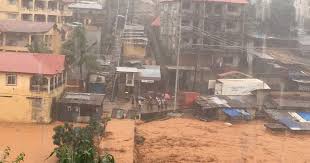By Sulaiman Aruna Sesay
Freetown, the capital city of Sierra Leone, has been hit by heavy rainfall that turned streets into rivers, leading to chaos and widespread disruption. The city’s drainage system has been overwhelmed, leaving residents stranded in their homes and vehicles. This has also caused a humanitarian crisis, with people struggling to access essential services such as healthcare and food.
The heavy downpour, which began from the start of July, triggered flash floods that created deep water channels on roads and bridges, making them impassable for vehicles and pedestrians. The worst-affected areas include Wellington, Lumley, Allen Town and Kissy. In some places, the water has risen to roof level, leaving houses and shops completely submerged.
The flooding has caused significant damage to infrastructure, with reports of collapsed houses, destroyed roads, and bridges. In some cases, the water has caused landslides, resulting in further damage and loss of life. The emergency services have been struggling to provide assistance, with many unable to reach the affected areas and having the full support necessary.
The situation has been aggravated by the lack of a proper drainage system in the city. Most of the drainage channels are blocked by debris and garbage, making it difficult for water to flow freely. This has been compounded by the rampant deforestation of the surrounding hills, which has increased the risk of landslides and flash floods.
The flooding has also affected the city’s economy, with many businesses and markets forced to shut down due to the non-availability of goods and services. The lack of power and water supply has further complicated the situation, with residents struggling to cope with the effects of the flood.
The heavy downpour that has hit Freetown has led to chaos and widespread disruption, calling for both short-term and long-term solutions. The government must implement a comprehensive drainage system that can withstand heavy rainfall and invest in reforestation of the surrounding hills. In the immediate, the government needs to provide emergency relief services to help residents cope with the situation. It’s time for the government to take proactive measures to prevent future flooding and ensure the safety and wellbeing of the citizens.













